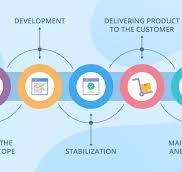Enhancing Cybersecurity Measures for Maximum Security Protection
The Importance of Security in Today’s Digital World
In today’s interconnected world, where information is constantly being shared and transactions are conducted online, security has become more crucial than ever. The rise of cyber threats and data breaches has highlighted the importance of implementing robust security measures to protect sensitive information.
Why Security Matters
Security is essential to safeguarding not only personal data but also financial assets, intellectual property, and critical infrastructure. Without adequate security measures in place, individuals and organizations are vulnerable to various cyber threats, including malware, phishing attacks, ransomware, and identity theft.
The Role of Encryption
Encryption plays a vital role in ensuring the confidentiality and integrity of data. By encrypting sensitive information, such as passwords, financial details, and communications, organizations can prevent unauthorized access and mitigate the risk of data breaches.
Best Practices for Enhancing Security
To enhance security in today’s digital landscape, it is essential to follow best practices such as:
- Implementing strong passwords and multi-factor authentication
- Keeping software up to date with the latest security patches
- Regularly backing up data to prevent loss in case of a breach
- Educating employees about cybersecurity awareness and best practices
- Monitoring network traffic for suspicious activities
The Future of Security
As technology continues to evolve rapidly, so do cyber threats. The future of security lies in adopting advanced technologies such as artificial intelligence (AI) and machine learning to detect and respond to threats proactively. By staying vigilant and investing in cutting-edge security solutions, individuals and organizations can stay ahead of cybercriminals and protect their digital assets.
Top Security FAQs: Understanding Cybersecurity, Protecting Personal Information, and Responding to Threats
- What is cybersecurity and why is it important?
- How can I protect my personal information online?
- What are common types of cyber threats to be aware of?
- Why is it essential to use strong passwords for online accounts?
- How can businesses improve their data security measures?
- What should individuals do in case of a data breach or identity theft?
What is cybersecurity and why is it important?
Cybersecurity is the practice of protecting computer systems, networks, and data from digital attacks. It encompasses various technologies, processes, and practices designed to safeguard against unauthorized access, data breaches, and other cyber threats. In today’s interconnected world where sensitive information is constantly being shared online, cybersecurity plays a crucial role in ensuring the confidentiality, integrity, and availability of data. It is important because cyber attacks can have severe consequences, including financial losses, reputational damage, and even legal implications. By investing in robust cybersecurity measures, individuals and organizations can mitigate risks and protect themselves from evolving cyber threats.
How can I protect my personal information online?
To protect your personal information online, it is essential to follow best practices for cybersecurity. Start by creating strong, unique passwords for each online account and consider using a password manager to securely store and manage them. Enable two-factor authentication whenever possible to add an extra layer of security. Be cautious about sharing sensitive information on social media and avoid clicking on suspicious links or attachments in emails. Regularly update your devices and software to patch vulnerabilities that cybercriminals could exploit. Lastly, educate yourself about common online threats and stay informed about the latest cybersecurity trends to safeguard your personal information effectively.
What are common types of cyber threats to be aware of?
When it comes to cybersecurity, being aware of common types of cyber threats is essential for safeguarding sensitive information. Some of the most prevalent cyber threats include malware, phishing attacks, ransomware, and social engineering. Malware refers to malicious software designed to infiltrate systems and steal data, while phishing attacks involve fraudulent emails or messages aimed at tricking individuals into revealing personal information. Ransomware encrypts files and demands a ransom for decryption, posing a significant threat to organizations. Social engineering tactics manipulate individuals into divulging confidential information or performing actions that compromise security. Understanding these common cyber threats is key to implementing effective security measures and protecting against potential vulnerabilities.
Why is it essential to use strong passwords for online accounts?
Using strong passwords for online accounts is essential to enhance security and protect sensitive information from unauthorized access. Weak passwords are easily compromised by cybercriminals through brute force attacks or automated password-cracking tools. Strong passwords, consisting of a combination of letters, numbers, and special characters, significantly increase the complexity and make it harder for hackers to guess or crack them. By using strong passwords, individuals can reduce the risk of identity theft, data breaches, and unauthorized account access, thereby safeguarding their online privacy and digital assets.
How can businesses improve their data security measures?
Businesses can improve their data security measures by implementing a comprehensive approach that addresses both technical and human factors. This includes investing in robust encryption protocols, regularly updating security software, conducting thorough risk assessments, and implementing multi-factor authentication. Additionally, educating employees about cybersecurity best practices and fostering a culture of security awareness can help mitigate the risk of insider threats. By staying proactive, vigilant, and continuously adapting to emerging threats, businesses can strengthen their data security posture and protect sensitive information from unauthorized access or breaches.
What should individuals do in case of a data breach or identity theft?
In the event of a data breach or identity theft, individuals should take immediate action to mitigate potential damage and protect their sensitive information. First and foremost, it is crucial to report the incident to the relevant authorities, such as the Federal Trade Commission (FTC) or local law enforcement. Additionally, individuals should contact their financial institutions to freeze accounts, change passwords, and monitor for any fraudulent activity. It is advisable to review credit reports regularly and consider placing a fraud alert or security freeze on credit files. Seeking assistance from identity theft protection services can also provide additional support in recovering from such incidents. Overall, prompt and proactive steps are essential in addressing data breaches and identity theft effectively.











